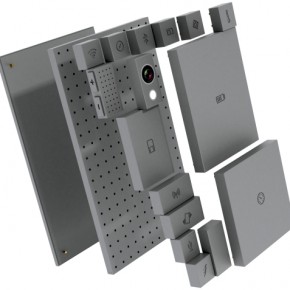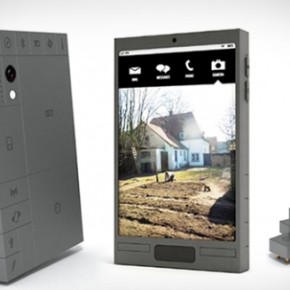- How to Adjust X and Y Axis Scale in Arduino Serial Plotter (No Extra Software Needed)Posted 3 months ago
- Elettronici Entusiasti: Inspiring Makers at Maker Faire Rome 2024Posted 3 months ago
- makeITcircular 2024 content launched – Part of Maker Faire Rome 2024Posted 5 months ago
- Application For Maker Faire Rome 2024: Deadline June 20thPosted 7 months ago
- Building a 3D Digital Clock with ArduinoPosted 12 months ago
- Creating a controller for Minecraft with realistic body movements using ArduinoPosted 1 year ago
- Snowflake with ArduinoPosted 1 year ago
- Holographic Christmas TreePosted 1 year ago
- Segstick: Build Your Own Self-Balancing Vehicle in Just 2 Days with ArduinoPosted 1 year ago
- ZSWatch: An Open-Source Smartwatch Project Based on the Zephyr Operating SystemPosted 1 year ago
Chat with Dave Hakkens: that’s why Phonebloks it’s about Co-Design and OpenSource
Phonebloks and Project Ara
Few days ago, after the presentation of the joint venture between Phonebloks and Motorola, called Project Ara, that I pretty enthusiastically commented earlier on this blog, we reached out to Phonebloks website with a contact request. Surprisingly enough we got very soon a very kind response from Dave Hakkens, the original creator of the Phonebloks idea and campaign. While navigating hundreds of emails with ideas and inspirations and, in parallel, building the platform that will help Phonebloks keep it’s independent vision going on, Dave found out some time so sit down in front of an hangout and share some time with us, discussing the next steps and the key points behind this incredible project that holds amazing promises.
My impression after having this chat with Dave, is that he is really committed to make this project work according to the original vision, behind the collaboration with Motorola. This will be possible thanks to the power of the community that he put together in one of the most successful crowd support campaign ever. Now Dave (and the team at Phonebloks) is really committed to one key next step: designing a platform that will enable a large scale, probably the largest, co-design project in the history of product design.
In the future of the Phonebloks project, there are lots of challenges, as you’ll see by reading the interview transcript or by watching the video attached, ranging from keeping independence to creating new tools for people to collaborate on hardware designs.
Having worked for several years in the Smartphone industry and being an opens source advocate since a while now, I’m pretty enthusiastic about Phonebloks and Project Ara. I think this is the biggest opportunity in history to, as a community, make a real difference and move forward with a new concept of product design and manufacturing, a concept that is longer term sustainable and enables creativity and innovation.
On my end, I’ll do my very best to bring this project to the upcoming Open Source Hardware Summit – that I’m co-chairing his year – because I’m pretty sure that in the future of the Open Source Hardware movement there should be more cooperation with the manufacturing companies: Consumer Electronics, give the huge impact it has on the environment, is definitely a good industry to start from and should be shortly followed by automotive (thanks to projects like OSVehicle), furniture (look at Slowd or OpenDesk) and many, many more.
Read this interview because it brings a lot of insights and will leave you faithful in a more sustainable product lifecycle for the future.
–
A Chat With Dave Hakkens: that’s why Phonebloks it’s about Co-Design and Open Source – Interview transcript
[Simone Cicero]: Dave, how did you arrive to the idea behind Phonebloks?
[Dave Hakkens]: It all started with a Compact Camera, like the ones you bring to vacations: when it broke up, naturally, I was looking to understand how to fix it and so it took the pieces apart. Everything inside it was working perfectly, the battery, the memory card: everything except for the lens motor. So I decided: ok let’s take a replacement one and fix it, but unfortunately Canon told me that this was impossible and I just needed to get a new one (the entire camera).
And, you know, that’s how it works with electronics: one part brakes up and you just throw it away. It’s not like this with other stuff: I mean it a tire gets broken in your bike, you just change it. It’s a very simple consideration but I wanted to see if I could bring any help to this topic.
[SC]: When did you decide that a social campaign like the one you put together would have been key to move forward with this idea? I mean, the discourse on this topic was actually already going on but you really succeeded to mobilize a lot of interest.
[DH]: For me it was a gradual process. I just started with this idea to have a phone that could last 100 years. Then, since I’m really amazed by phone technologies, I just started to think to this idea of the “modular phone”. Anyway, to do this I thought that I would have needed a lot of companies onboard. Company, though, wouldn’t probably take me seriously and so I decided that I would have gone the other way around: gathering first a lot of people and show them that this was a serious project and a serious vision: that’s why I created this campaign, to make it more than just an idea.
[SC]: Regarding Motorola: I’ve read some interviews of you and from what I get, Motorola was already into a similar vision and project so they basically decided to join efforts with you and the community: am I right?
[DH]: In a way, they were already working on something similar, but more on the technical side. So they basically they asked me if I wanted to join the project and bring this community vision. But, you know, it didn’t sound interesting to me because I really wanted to bring this project to life as modular, open source and made to last, and I was afraid that would have ended up with just me joining their project and being just one of the opinions.
So instead we kept this a bit different, now we are working together and it’s not just me criticizing or giving the advices but it’s the whole community, and this never happened on such a large scale, with such a large company, and that’s what I’m currently most excited about, getting this thing going on.
[SC]: Is it only Motorola working on this or the idea is to make it an alliance? Like it was for Android?
[DH]: For me Phonebloks it’s a vision and not a company that builds phones. We are looking for more partners, as I guess the more the better, that wants to build such a phone.
[SC]: What’s the role of open source in this project? Was it something key already in the initial vision?
[DH]: I’ve been always fascinated and inspired by the WordPress project: they‘ve made the architecture so open with people developing plugins and that’s what makes it so rich, this abundance of plugins with people contributing. It’s much more than a company: there’s a marketplace with companies, startup, developers that can create and that’s the direction I think we want to go with Phonebloks.
[SC]: What’s the next step regarding Phonebloks as an organization? Would you incorporate it in a company? Foundation? It’s just you or it will be an inclusive project with people able to volunteer?
[DH]: Right now we are building and launching this platform where we can post questions and people can contribute with their best answers and upvote them. Also companies building the phone may be able to get feedbacks on their advancements on building this. For the rest, we really want to keep Phonebloks independent so a foundation may be a potential solution even if we really didn’t decide on it yet
[SC]: So Phonebloks is really about managing a Co-Design process and being the middlemen between people and the companies that wants to build this. Am I right?
[DH]: Well, when we started this project we really didn’t know what we wanted to do, but at this point in time, we have a company that wants to build this and a lot of people that want to contribute and help this vision to get real with knowledge and resources: that’s now our mission I guess, building the platform to make this conversation and interaction possible.
 [SC]: There’s an interesting point about this: as Motorola and other companies they probably have a strong understanding about how to build consumer electronics they can probably be dominant on the technical aspects respect to the community. Maybe this could end up with a weaker adherence to the original vision. So I guess it’s important also to mobilize technical knowledge from the community, with engineers and technical experts.
[SC]: There’s an interesting point about this: as Motorola and other companies they probably have a strong understanding about how to build consumer electronics they can probably be dominant on the technical aspects respect to the community. Maybe this could end up with a weaker adherence to the original vision. So I guess it’s important also to mobilize technical knowledge from the community, with engineers and technical experts.
[DH]: That concern would have been much more serious if it was just me working with them (Motorola). They would have probably developed the project in the labs, for two years and then came up with something on the market. But the interesting thing about this project is that they decided to develop this in the open – and that’s was exactly because we had this enormous community support. In this way, if they decide something wrong such as, for instance, they choose a wrong type of plastic, normally it would have been just me saying “hey guys I don’t like this”; now there will be all the people giving negative feedbacks and at that point in time if they really don’t want this bad publicity they’ll be probably follow the suggestions coming from the community itself. It’s a powerful position, people can really drive the project.
[SC]: In a way I think it’s really interesting what you did with the campaign since you also shown to these companies that theirs is an important market validation of such a product and on the other hand you actually explained people that they can ask companies to build such kind of products. That’s the big WOW behind Phonebloks campaign I guess.
But, getting back to the community: what’s the actual roadmap for the platform and in what ways people will be able to participate and make Phonebloks a real success?
[DH]: Well, we received thousands of emails with suggestions and ideas but it was really impossible to read them all, so what we are doing now is basically building this stack overflow like platform to raise ideas and questions and upvote them, so that you don’t need to read all the answers, it’s enough to read the best ones. Then the idea is to have a place when in the beginning people will be able to participate saying what kind of blocks they want or maybe suggest the name of the phone. In the future we also want this to be the place for the hardware modules: in the winter we want to release this Developer Kit so that the people can start prototyping their modules and see what’s going on. We also want to have this place online where people can share the things they make and work on it together. In the end the main goal is to have people to be able to collaborate and develop hardware in the open, and we are now thinking that also it’s maybe important for us to develop the tools to enable this and make it easy like it is right now to develop software in the open – it wasn’t so easy ten years ago. We actually want to use the platform we are launching also to discuss with the people what tools they want to work together on specifications and all.
[SC]: A last question: maybe it’s too early in the process but I’m interested to know if you and Motorola already discussed and wondered about the actual impact that this product may have in the manufacturing process, and also on the supply chain related to that. Is there any discussion or idea ongoing?
[DH]: Again, I think it’s a question of tools: right now to produce a blok you really need to think about large scale numbers, thousands if not millions. Instead if you want to produce your own you don’t really have the tools. 3D printing is a nice tool but it’s probably not mature enough, and right now we are looking at how this tools can fit within this project. It’s something we are having in the back of our mind, it’s about enabling the people to produce these things and make this tools available for the people.
[SC]: It’s interesting because the very role of the manufacturer changes in this way, and all the manufacturers joining this alliance must probably start to rethink their role in the value chain as in this way manufacturing gets really distributed, in the hands of end users.
[DH]: Exactly, the point is that the tools aren’t ready yet, so in parallel we probably need to develop these tools. It’s a long process but we have to start somewhere! It will come!
[SC]: Thanks Dave!
If you liked the interview, please follow @meedabyte and @OpenElectronics.

















Pingback: Phonebloks Open Source Smartphone Vision explained « Boardmad
Pingback: Chat with Dave Hakkens: that’s why Phoneb...
Pingback: P2P Foundation's blog » Blog Archive » Dave Hakkens about the Co-Design of Phonebloks
Pingback: Dave Hakkens about the Co-Design of Phonebloks | PDX Currency Corporation
Pingback: 2013年最不可思议的10个硬件开源项目 | FuckDay
Pingback: Open Hardware Summit 2014 Rome: From Making Open to Open Manufacturing | Open Electronics
Pingback: Phonebloks releases first year update – Keep up! | Open Electronics